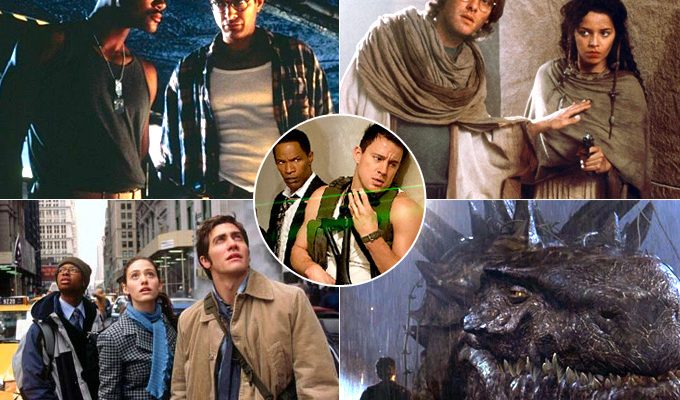 “Anonymous” (2011)
“Anonymous” (2011)
The poster for “Anonymous” provocatively asks, “Was Shakespeare a fraud?” The answer, of course, is “no.” But that doesn’t stop Emmerich — that student of history who had wooly mammoths constructing the Egyptian pyramids in “10,000 BC” — from conjuring this rococo historical bore. It starts in present-day England, and then goes back in time, further and further until we reach the end of the Elizabethan era, when the movie goes to great pains to suggest that Edward de Vere (Rhys Ifans), the 17th Earl of Oxford, who was forbidden to write (it would bring great shame to his family) but does so anyway, is the true scribe behind the works we attribute to William Shakespeare. After some confusion, the villainous Shakespeare (Rafe Spall) takes credit for de Vere’s plays and (among other things) extorts de Vere to build the famous Globe Theater and kills Christopher Marlowe (Trystan Gravelle), after Marlowe discovers that Shakespeare is a fraud. The whole thing is ridiculous and silly, but not in the escapist sense of Emmerich’s better films. The question about whether or not Shakespeare authored all of this immortal works is a good one, even if the answer is somewhat anticlimactic, and a decent enough movie could be made out of the inquiry. But Emmerich’s more-is-more approach, which leaves subtlety behind and instead insists on a flashback-heavy Russian nesting doll of out-there conspiracy theories, isn’t the right one. Sure, there’s a whole lot of period spectacle to soak in and a touch of Greek tragedy, but since so little of it makes any sense, it’s very hard to ever really engage with the narrative. [D]
“Making Contact” (1985)
Also known as “Joey,” this West German fantasy movie is Emmerich going “full Spielberg.” The movie, like many of Emmerich’s best, starts out intriguingly enough, with a young boy mourning his dead father. Soon enough, objects in his room start to levitate and a toy phone beams in an actual conversation from the dearly departed dad. But things start to get significantly weirder: the young boy develops telekinetic powers (it doesn’t go over well at school) and pretty soon a ventriloquist dummy in his room starts to tell him that it’s not his father he’s talking to, but rather the spirit of an evil magician (or something). Pretty soon all sorts of demonic creatures and questionable optical effects show up, with Emmerich borrowing liberally from both “E.T.” (there’s even a moment where the kid is drinking milk from an E.T. glass) and “Poltergeist” (particularly as the movie goes along, with keen attention paid to the lighting in that earlier, better movie). When released stateside by B-movie titan Roger Corman‘s New World Pictures, “Joey” was heavily edited and renamed “Making Contact.” The extensive dubbing and odd grasp of American culture (there seems to be “Star Wars” paraphernalia in almost every shot) make the movie even stranger and more charming, especially when combined with Paul Gilreath‘s soaring, John Williams-esque score. It doesn’t make a lick of sense, and all of the supernatural gobbledygook definitely slows things down. But as an early indicator of the director’s ability to conjure forth wide-eyed wonder, “Making Contact” is a delightful little romp, and at only 79 minutes, it won’t take up too much of your time. [C]
“The Patriot” (2000)
The closest Emmerich has ever come to having a genuinely underrated film, “The Patriot” is a lavish historical revenge movie that follows a man (Mel Gibson) and his son (a young Heath Ledger) who fight back against the British after an evil Colonel (Jason Isaacs) kills a young family member (and burns down their house). Large thematic concerns, about the nature of guerilla warfare, slavery, cultural identity and the dynamics of teamwork/family, are threaded throughout “The Patriot.” But mostly it’s a warmhearted, horrifically violent, incredibly kick-ass revenge movie, one whose Emmerich-approved earnestness affects you deeply (even while you’re rolling your eyes). It’s unequivocally the most beautiful-looking Emmerich movie ever (it was shot by the legendary Caleb Deschanel), with painterly compositions that will cause you to stare, mouth agape, at the sheer majesty of it. It’s also the most beautiful-sounding Emmerich movie, thanks to John Williams’ sweeping score. In later movies, Emmerich seems to have lost his mojo when it comes to staging action sequences on the ground (ones that don’t involve massive flyovers of crumbling city-states). But here he’s totally in command of his craft, and each giant action set piece is brilliantly choreographed and easy to follow. Today, it’s worth re-watching for Ledger’s performance, which might not be as brilliant as his later work, but is just as commanding. There have been relatively few movies made about the American Revolutionary War, and it’s a miracle this one turned out as well as it did. In the Story of Emmerich, this is also an important movie, because it marks the last time Emmerich worked with Dean Devlin, his longtime co-writer/producer and general creative other half. [C]

